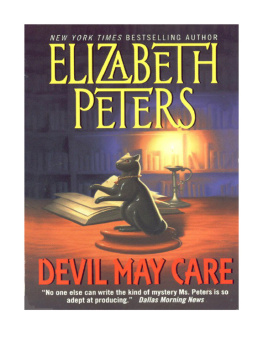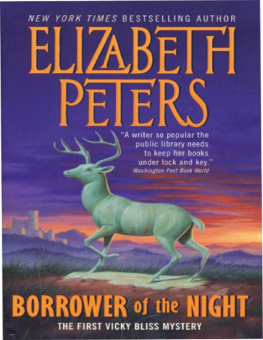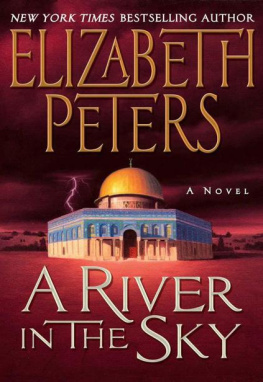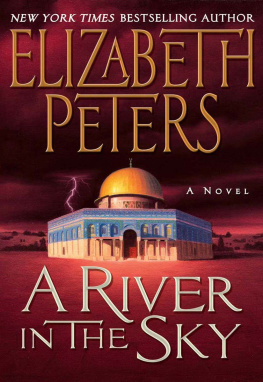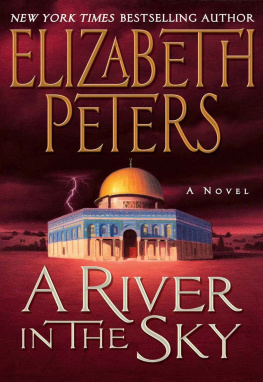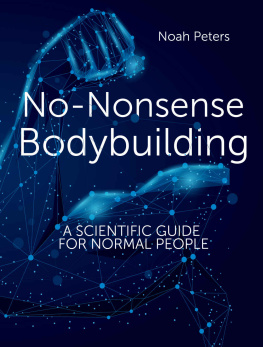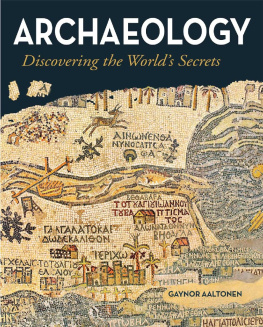
Elizabeth Peters
Crocodile On The Sandbank
The first book in the Amelia Peabody series, 1975
The love of my beloved is on yonder side A width of water is between us And a crocodile waiteth on the sandbank.
Ancient Egyptian Love Poem
Although my major characters are wholly fictitious, certain historic personages make brief appearances in these pages. Maspero, Brugsch and Grebaut were associated with the Egyptian Department of Antiquities in the 1880's, and William Flinders Petrie was then beginning his great career in Egyptology. Petrie was the first professional archaeologist to excavate at Tell el Amama and I have taken the liberty of attributing some of his discoveries-and his "advanced" ideas about methodology-to my fictitious archaeologists. The painted pavement found by Petrie was given the treatment I have described by Petrie himself. Except for discrepancies of this nature I have attempted to depict the Egypt of that era, and the state of archaeological research in the late nineteenth century, as accurately as possible, relying on contemporary travel books for details. In order to add verisimilitude to the narrative, I have used the contemporary spelling of names of places and pharaohs, as well as certain words like "dahabeeyah." For example, the name of the heretic pharaoh was formerly read as "Khuenaten." Modern scholars prefer the reading "Akhenaten." Similarly, "Usertsen" is the modern "Senusert."
WHEN I first set eyes on Evelyn Barton-Forbes she was walking the streets of Rome -(I am informed, by the self-appointed Critic who reads over my shoulder as I write, that I have already committed an error. If those seemingly simple English words do indeed imply that which I am told they imply to the vulgar, I must in justice to Evelyn find other phrasing.)
In justice to myself, however, I must insist that Evelyn was doing precisely what I have said she was doing, but with no ulterior purpose in mind. Indeed, the poor girl had no purpose and no means of carrying it out if she had. Our meeting was fortuitous, but fortunate. I had, as I have always had, purpose enough for two.
I had left my hotel that morning in considerable irritation of spirits. My plans had gone awry. I am not accustomed to having my plans go awry. Sensing my mood, my small Italian guide trailed behind me in silence. Piero was not silent when I first encountered him, in the lobby of the hotel, where, in common with others of his kind, he awaited the arrival of helpless foreign visitors in need of a translator and guide. I selected him from amid the throng because his appearance was a trifle less villainous than that of the others.
I was well aware of the propensity of these fellows to bully, cheat, and otherwise take advantage of the victims who employ them, but I had no intention of being victimized. It did not take me long to make this clear to Piero. My first act was to bargain ruthlessly with the shopkeeper to whom Piero took me to buy silk. The final price was so low that Piero's commission was reduced to a negligible sum. He expressed his chagrin to his compatriot in his native tongue, and included in his tirade several personal comments on my appearance and manner. I let him go on for some time and then interrupted with a comment on his manners. I speak Italian, and understand it, quite well. After that Piero and I got on admirably. I had not employed him because I required an interpreter, but because I wanted someone to carry parcels and run errands.
My knowledge of languages, and the means which enabled me to travel abroad, had been acquired from my late father, who was a scholar and antiquarian. There was little else to do but study, in the small country town where Papa preferred to live, and I have an aptitude for languages, dead and alive. Papa preferred his languages dead. He was a devoted student of the past, and emerged from it only occasionally, when he would blink at me and express surprise at how I had grown since he last noticed my existence. I found our life together quite congenial; I am the youngest of six, and my brothers, being considerably older, had left the nest some time before. My brothers were successful merchants and professional men; one and all they rejected Father's studies. I was left, then, to be the prop of my father's declining years. As I have said, the life suited me. It allowed me to develop my talents for scholarship. But let not the Gentle Reader suppose that I was ill equipped for the practical necessities of life. My father was disinclined toward practicalities. It was left to me to bully the baker and badger the butcher, which I did, if I may say so, quite effectively. After Mr, Hodgkins the butcher, Piero gave me no trouble.
My father died, eventually- if one may use so precise a word for the process that took place. One might say that he gradually shriveled up and ran down. The rumor, put about by a pert housemaid, that he had actually been dead for two days before anyone noticed, is a complete exaggeration. I must admit, however, that he might have passed away at any point during the five hours I spent with him in his study on that particular afternoon. He was leaning back in his big leather chair, meditating, as I assumed; and when, warned by some premonition, I hurried to his side, his wide-open eyes held the same expression of mild inquiry with which they had always regarded me. It seemed to me quite a respectable and comfortable way in which to pass on.
It came as no surprise to anyone to discover that he had left his property to me, the aforesaid prop, and the only one of his children who had not an income of its own. My brothers accepted this tolerantly, as they had accepted my devoted service to Papa. They did not explode until they learned that the property was not a paltry sum, but a fortune of half a million pounds. They had made a common mistake in assuming that an absentminded scholar is necessarily a fool. My father's disinclination to argue with Mr. Hodgkins the butcher was due, not to lack of ability, but to disinterest. He was very much interested in investments, " 'change," and those other mysterious matters that produce wealth. He had conducted his business affairs with the same reticence that marked his habits in general; and he died, to the surprise of all, a wealthy man.
When this fact became known, the explosion occurred. My eldest brother James went so far as to threaten legal proceedings, on the basis of unsound mind and undue influence. This ill-considered burst of temper, which was characteristic of James, was easily stopped by Mr. Fletcher, Papa's excellent solicitor. Other attempts ensued. I was visited by streams of attentive nieces and nephews assuring me of their devotion- which had been demonstrated, over the past years, by their absence. Sisters-in-law invited me, in the most affectionate phrases, to share their homes. I was warned in the strongest terms against fortune hunters.
The warnings were not unselfish; they were, however, unnecessary. A middle-aged spinster- for I was at that time thirty-two years of age, and I scorned to disguise the fact- who has never received a proposal of marriage must be a simpleton if she fails to recognize the sudden acquisition of a fortune as a factor in her new popularity. I was not a simpleton. I had always known myself to be plain.
The transparent attempts of my kin, and of various unemployed gentlemen, to win my regard, aroused in me a grim amusement. I did not put them off; quite the contrary, I encouraged them to visit, and laughed up nry sleeve at their clumsy efforts. Then it occurred to me that I was enjoying them too much. I was becoming cynical; and it was this character development that made me decide to leave England -not, as some malicious persons have intimated, a fear of being overborne. I had always wanted to travel. Now, I decided, I would see all the places Father had studied- the glory that was Greece and the grandeur that was Rome; Babylon and hundred-gated Thebes.
Next page

